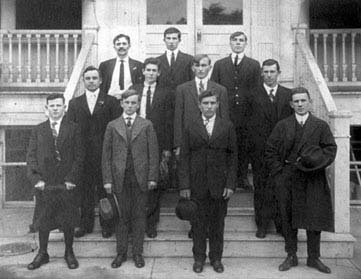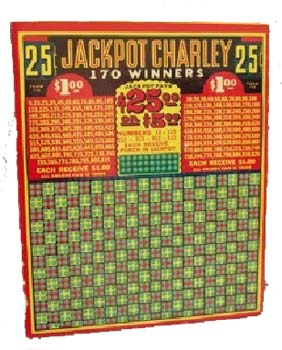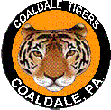|
More on Harold's Corner Store
The men in town all had their favorite bars, clubs, and/or taverns. The "regulars" in each particular establishment might be determined by location or by affiliation. Bar's
such as Wargo's Bar and Grill attracted patrons from a few blocks surrounding it's spot at 4th and Philip Sts. Others such as the VFW and the American Legion attracted mostly members of each
organization. Still others included the Russian Club or the Lithuanian Club, whose membership was mostly determined along ethnic lines.
Generally it was permissible for an "outsider" to stop into an establishment that was not part of his usual domain, so long as he acted with the proper
decorum. More than likely somebody would recognize the new person as a citizen of the town, so it wasn't a total stranger coming in. Also of course, coming in with one of the regulars as a guest was ok.
It was expected that you wouldn't come in and start acting like you owned the place or trying to pick a fight with a regular. The usual patrons did enough of that acting out anyway and that was part of the atmosphere.
The same could be said for the 'Under-21' group of guys that made the corner store their hangout. Proximity to the store usually defined which one could be called "yours". Since Harold's was
about a 100 ft. walk from my front door, that was my place. Often when visiting my cousin, Punch Panchura, who lived on 2nd St. near Ridge St., we went to Mike's Model Garage at 1st and Ridge Sts. in
search of fun and/or treats. The store was a part of the garage where Mike had 2 work bays and a gas pump. He had candy, soda, and ice cream... along with a pool table and a few pinball machines. What
I remember most about the place was the smell and feel of grease everywhere you went and with everything you touched. It was more of a day hangout for guys in their 20's and into cars.
 Other places were simple residential homes where the front room had a small display case
and a drink/ice cream cooler. Joe Laigon on Philip St. had such a place. We all knew his son was Dr. Eugene Laigon in town, but I only found out much later that Joe was one of the survivors of the Foster Tunnel
Disaster. In 1915 eleven men were trapped in the tunnel for six days after an explosion and flood. By the time I knew him, Joe had a hard time getting around and was all but totally blind. Still, he had his candy store and his pride.
Other places were simple residential homes where the front room had a small display case
and a drink/ice cream cooler. Joe Laigon on Philip St. had such a place. We all knew his son was Dr. Eugene Laigon in town, but I only found out much later that Joe was one of the survivors of the Foster Tunnel
Disaster. In 1915 eleven men were trapped in the tunnel for six days after an explosion and flood. By the time I knew him, Joe had a hard time getting around and was all but totally blind. Still, he had his candy store and his pride.
Survivors at hospital 1915
Another such store was Lenny Puchinski's at 3rd and High Sts. Like Joe, Lenny was legally blind and ran the store from the front of his house. All of the altar boys at St. Mary's in the 50's knew
Lenny and his mother. Both were at the 8 o'clock mass every single morning, regardless of the weather. Lenny could barely see and his mother could barely walk, but somehow they both were there every day in the front
row and also up for communion. The saddest day I ever experienced as an altar boy was serving the requiem mass for Lenny's mother. Lenny was in his usual spot in the church and just kneeled there by himself with tears
running down his cheeks. Back then communion wasn't distributed to the congregation during a requiem mass. Only the priest took communion for himself. Nonetheless, at communion time Lenny got out from the pew and
came up to knee at the altar railing, waiting for his communion. Fr. Cannon hadn't noticed Lenny there and began to move on with the mass. We signaled to him that Lenny was quietly waiting at the rail. Fr. Cannon stopped
and took a host from the tabernacle and brought it to Lenny, who then blessed himself and returned to his seat.
Harold's ranked about midway on the scale of size and features of the "Coaldale Corner Store" spectrum. It was a dark dilapidated building from the very first that I remember going there.
He sold basic food needs. There was a dairy case which included eggs and packaged lunch meats and cheeses. He had a decent selection of canned goods and bread. The three places I usually gravitated to were the ice cream
chest, which I was barely tall enough to see over; the glass candy cabinet, which was covered with the fingerprints and tongue smears of dozens of small kids; and the soda chest, which didn't have any refrigeration. Fredrick's Coal
and Ice delivered a block of ice each day which Harold chopped up and dumped into the chest. Of course Harold always maintained a good stock of Lucky Strike and Camel cigarettes, Philly and White Owl cigars, and Mail Pouch
and Red Man chewing tobacco.
Harold and/or Rosie were typically there but occasionally their sons Bobby and Harold Jr. were also there to lend a hand. Both were 8 to 10 years older than I was and a lot more fun to hang out with. Bobby
had a technique for splitting a Twinsicle that few of us could master. A Twinsicle was an ice pop molded in two parts with two sticks. The trick was to be able to split it down the crease for two separate treats'.one to save for later or
to share with a buddy now. A bad split meant you now had a bottom half with two sticks and a top half without any stick. Bobby knew how to hit it just right for a good split. If you were alone (or just didn't want to share it) Bobby let us
save the other half in the store freezer for later in the day.
Harold had a lot more to offer the customer than just food products. As I've already mentioned, there were several pinball machines to choose from. At one point, Harold brought in a couple of slot machines. There
was a nickel machine and a dime machine hidden (not very well at all) behind a curtain near the back of the store. These machines were nothing like the current glitz and glamour noisemakers found in modern casinos. They were strictly
mechanical'a true one-armed bandit. Drop a coin – pull the handle – watch the 3 wheels spin with various types of fruit on them. The machines disappeared late one night after the local barracks of the Pennsylvania State Police
got wind of a rumor that identified several local stores having the illegal gaming devices.
Harold had other means of meeting the interests of a clientele who enjoyed a game of chance. As I already noted, pinball games won could be cashed in for a nickel each. Five days a week, patrons had the chance
to "play the ponies" at Harold's. The rules were very simple and basically follow the current "Pick Three" games that many states run legally on a daily basis. Back then, the player went into Harold's and gave him
their 3-digit choice for the day. The bet could be any amount from a nickel on up. Harold wrote the number down – along with the customer's name and date - on a little 2-part pad. Harold kept the original and gave the player a carbon
copy. Later in the day the winners of 3 different horse races were announced and the number of each horse posted. That became the winning 3-digit number for the day. Where were the races being run and who decided on which races to
choose was always a mystery. My guess is that some "Godfather" bookie in the area decided what the number would be. Harold didn't allow us kids to play the slots or the ponies, but if I had to identify who got my mother
hooked on slot machines much later in life, you only need to ask Harold. Mom bought a "dream book" where you could look up a topic for a dream you just had, and the book provided you with a 3-digit number to match.
Sometimes Mom just got frustrated and sent me over to Harold's with a dime and a nickel.
"Give Harold the dime and you pick a number you like. Make sure you get the paper slip from him. The nickel is for you". Later in the day it was my job to run over to Harold's and ask for the winning number. Hopefully
another spare nickel would be offered.
 Punch Boards "I'm betting
that not too many readers know what I'm talking about here...unless you're my age and grew up in a small town with stores like Harold's. A picture is worth
a thousand words and I found a picture of such a board on eBay. Harold usually had several of these boards on top of the candy counter. Harold got the boards
from Jim McCartney's Confectionary Supply store. McCartney's was the supplier from most of the 'Corner Stores' in Coaldale. Punch Boards "I'm betting
that not too many readers know what I'm talking about here...unless you're my age and grew up in a small town with stores like Harold's. A picture is worth
a thousand words and I found a picture of such a board on eBay. Harold usually had several of these boards on top of the candy counter. Harold got the boards
from Jim McCartney's Confectionary Supply store. McCartney's was the supplier from most of the 'Corner Stores' in Coaldale.
The game was quite simple – for whatever the cost was to play – any amount from a nickel to a quarter, you got to knock out a hole in the board with a small metal "punch'. Reach around the back of the board to retrieve a folded-up piece of paper that came out of the Punch Board, which was usually about ¾ inch thick. Unfold the paper and compare your number to the pre-assigned numbers on the board to see if you are a winner. If you look carefully at the board in this picture, you'll see 4 separate holes to be punched in each of the red and green squares on the lower half of the board. Sometimes a winning number in the lower half gave you a shot at one of the holes in the "Jackpot" section.
With a new Punch Board, the entire prize package was available, but on the other hand an older board had only a few punches left and hopefully a winner would be easier to find. I'm sure Harold kept a close record of the winners on a particular board and I often wondered if he left a "dead" board on the counter, knowing all the winners had been found.
Harold was pretty good about not letting really young kids play the board, but as a boy in my early teens, he figured I was old enough to know what I was doing with my money. I rarely – if ever – played the boards for cash prizes, but one day I walked into Harold's to find a brand new board sitting on the candy counter with "Win a Transistor Radio" across the top. In the late 50's a transistor radio was something brand new and coveted by most teenagers.
The radio was our primary source for music in general...and Rock & Roll in particular. The typical tube radio was limited by the electrical cord needed for power. A few years earlier my parents bought me a Motorola Portable Radio for Christmas. It played with the usual power cord, but you could also buy a battery (two actually) that made it portable. The only problem was thebatteries were special and cost about $15. It may not sound like much now, but back then it was a half-days/ pay for my father. I remember they bought me one set of batteries that summer and that was it.
The Transistor began to take the place of tubes in radios. Since they didn't require heating up a tube to process a radio signal, they ran with very little electrical power. The radio sitting on the shelf behind Harold's candy cabinet ran on just two AA batteries and that was enough to power it for weeks at 6 hours per day. It came with a "genuine vinyl case and earphone for private listening"
I had to have that radio !
I put down a quarter on the candy case and grabbed the punch ring. There weren't more than a dozen punches taken so far, and unlike the cash prize boards, you knew the radio was still available because there it was...only 4 feet away from me on the shelf. I had already memorized the winning number posted on the board and I carefully peeled open each of the punches in search of that number. I was down to my next-to-last punch and as I unrolled it, each of the three digits came into view. I WON !! I scared the hell out of Rosie, Harold's wife, who was minding the store that afternoon. Frankly, Rosie didn't know what to do because this was something new to her.
"Rosie...look! The board says the winning number is 500. Here it is ! 500 ! I Won "!
Rosie told me Harold would be down to the store (they lived half a block away on Ruddle St.) in about an hour. I carefully put the slip in my pocket and watched at the corner until I saw Harold coming down to the store. He was surprised, and frankly a bit pissed, that the radio had gone so fast. Still, he couldn't deny that I had the winning slip, so he reluctantly took the radio off the shelf, put it into it's box, and handed it to me. It was the last time Harold offered a product as a punch board prize. It was back to cash from then on.
I had one slight problem about this unexpected windfall. Mary and Chappy did not approve of gambling by minors in general'and their son in particular. They made one exception to this rule when it came to pinball machines because typically we didn't cash in games won, but just simply played until we ran out of games and/or nickels. Now if I had won money on the punch board, at least I could hide it and spend only enough to not raise any suspicion. With a transistor radio, it was not the sort of thing that could be hidden. I figured I was better off telling the folks about my new radio before they heard it from someone else...like Harold for instance. Neither of them showed any sign of pleasure with my winnings, but after a few minutes of debate, with me being reclused to outside, they decided I could keep the radio. One condition was no more punch boards until I was at least 18. I'm guessing that Chappy was glad that I no longer would be bugging him for those $15 batteries.
|

 Other places were simple residential homes where the front room had a small display case
and a drink/ice cream cooler. Joe Laigon on Philip St. had such a place. We all knew his son was Dr. Eugene Laigon in town, but I only found out much later that Joe was one of the survivors of the Foster Tunnel
Disaster. In 1915 eleven men were trapped in the tunnel for six days after an explosion and flood. By the time I knew him, Joe had a hard time getting around and was all but totally blind. Still, he had his candy store and his pride.
Other places were simple residential homes where the front room had a small display case
and a drink/ice cream cooler. Joe Laigon on Philip St. had such a place. We all knew his son was Dr. Eugene Laigon in town, but I only found out much later that Joe was one of the survivors of the Foster Tunnel
Disaster. In 1915 eleven men were trapped in the tunnel for six days after an explosion and flood. By the time I knew him, Joe had a hard time getting around and was all but totally blind. Still, he had his candy store and his pride. Punch Boards "I'm betting
that not too many readers know what I'm talking about here...unless you're my age and grew up in a small town with stores like Harold's. A picture is worth
a thousand words and I found a picture of such a board on eBay. Harold usually had several of these boards on top of the candy counter. Harold got the boards
from Jim McCartney's Confectionary Supply store. McCartney's was the supplier from most of the 'Corner Stores' in Coaldale.
Punch Boards "I'm betting
that not too many readers know what I'm talking about here...unless you're my age and grew up in a small town with stores like Harold's. A picture is worth
a thousand words and I found a picture of such a board on eBay. Harold usually had several of these boards on top of the candy counter. Harold got the boards
from Jim McCartney's Confectionary Supply store. McCartney's was the supplier from most of the 'Corner Stores' in Coaldale.